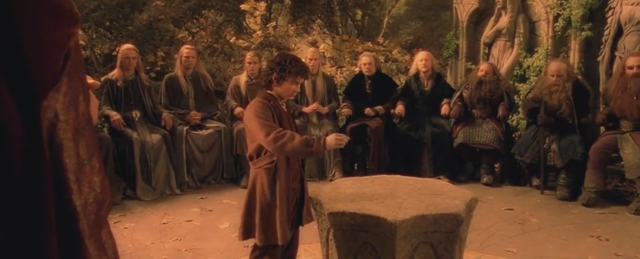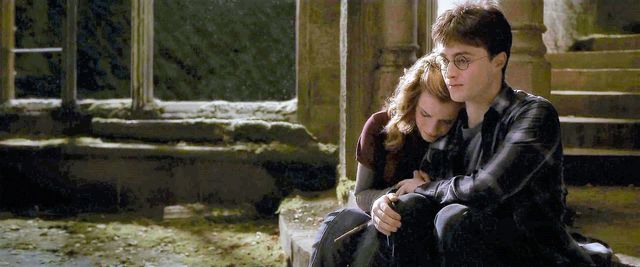Entering Storyland: Why We Become Immersed in the Tales We Read
He was a simple hobbit whose uncle happened to possess a decent fortune and enjoy longevity.
So why do we care about Frodo? Why does the unfolding narrative of his quest to destroy the One Ring enrapture us?

Image via lotr.wikia.com
Or think of Harry Potter. An unremarkable English kid with a tragic past, terrible relatives, and a penchant for disobeying the rules. Yet he’s one of the wizarding world’s most well-known names, and the tales of his years at Hogwarts have captured the imaginations of millions.
I could go on, listing story after story, journey after journey. Some written better, more entertaining, or more thought-provoking than others, but all with a common thread running through them.
They’re not real, but in our minds, it’s as if they are.
In her article last week, Becky Miller discussed the theme of victory in speculative fiction, and concluded with this:
Speculative fiction…reminds us of what we hope for.
There are many reasons we enjoy stories.
- The plot.
- The characters.
- The themes.
- The world.
However, these don’t dig deep enough. They don’t reach to the core of why stories hold such an enchanting sway upon us. The reason, as Becky alluded to, is simple.
 They show us what we hope for.
They show us what we hope for.
In many ways, fictional stories are scattered pieces of glass, each shard a different color, broken off from some real-world source and then reassembled into a mesmerizing stained-glass masterpiece.
It’s the echoes of hope, those intersections of fiction and reality, that drive the storytelling engine. After all, if we’re not invested in a character, in what they do and what happens to them, then the story’s power dies.
How does this idea of “what we hope for” play out in stories? Why does it provide such a potent appeal?
Phase 1: Entrance
Excluding the continuation of a series, in which case many elements and characters are already familiar, this is where the reader starts. Square one. Jason Bourne before he learns anything about himself or his situation.
At this point, we’re inching our way down the gentle slope into the shallow side of the pool, feeling our way forward and seeing where the next step will take us. Will the story engage our minds? Present a compelling story arc? Introduce a relevant theme? Provide relatable, likeable characters?
If the answer is yes, we move forward with more confidence. Each step builds our trust and reveals more of the world we’ve entered, giving details, hinting at background, fleshing out the characters and plot.
Phase 2: Familiarity
Once the foundation is laid, we begin connecting with the story on deeper and more meaningful levels. We start to relate to the characters and care what happens. And parts of their journey become mini mirrors, reflecting our own journeys in familiar ways.
Returning to the Harry Potter analogy, we all know what it’s like to be involved in difficult relationships. We know what it’s like to be disliked, bullied, mistreated. We empathize with his situation, and suddenly, subconsciously, we’ve taken a thread of our story and woven it into the fabric of what we’re reading.

Image via harrypotter.wikia.com
It happens again and again, sometimes in small, unnoticeable ways. Sometimes in ways that resound with the clarion call of truth such that we wonder if we’ve actually become the character in the story.
That’s where “what we hope for” bounds in, and where we enter the deepest phase.
Phase 3: Immersion
No more tiptoeing into the shallow end of the pool now—we’re diving to the bottom of the end that’s 10 feet deep. We root for Harry, not because he’s good looking or is one of the “cool kids” but because we’re relating to his story in personal ways that tie back to our own stories.
And we hope.
We know the importance of winning that final Quidditch match of the season, so we hope Gryffindor triumphs.
We know the beauty of having close friends, so we hope Ron and Harry and Hermione stick together, and we find it fulfilling when they help each other and laugh together.
We know what it’s like to have enemies, so we hope Harry can overcome his.
But secretly, I think, we’re not only hoping for Harry. We’re hoping for ourselves, too. We’ve become invested, involved, immersed in the story. And we hope. If things turn out all right for Harry, maybe they’ll turn out all right for us, too.
On a broader scale, we encounter the end of the tale…where the villain is vanquished and good wins out. We look to our own lives, and we hope.

Such is the power of storytelling. It resonates because deep down, we know it’s true. Maybe not in the same ways fictionally as in reality, but true all the same. The reason?
Our lives are a continuous string of stories. We understand story, even if we don’t realize it. When we cross the magic threshold into the fictional realm of storyland, we’re getting a glimpse—albeit unique and different—of our stories.
Thanks to that correlation, stories can, and constantly do, remind us of what we hope for in our stories.
Why do you think we connect with stories?









































